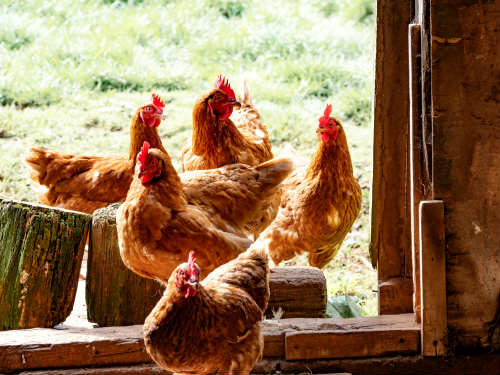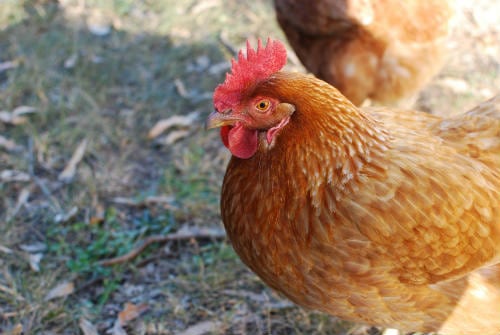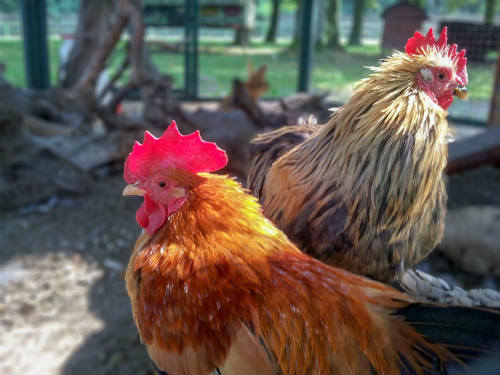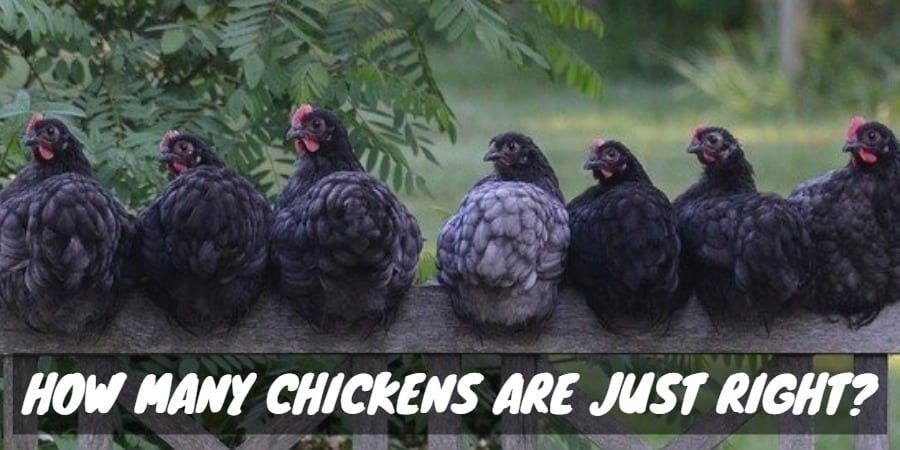As the warmer months approach and hot summer days are here to stay, it is time to think of your flock. Is your flocks’ environment cool enough to withstand the hot summer rays? If not, it is possible that you may need to make some adjustments for your chickens to stay cool this summer. Here’s how?
During this time of the year, summer days usually have temperatures that rise above 90 degrees. This rise in temperature may cause health issues for your flocks such as heat stroke or even death. For the most part, the average body temperature for hens ranges from 104-107 degrees. This temperature is ideal for keeping them warm during the winter months, but not so good for the hot summer days.
It’s not like they can take their feathers off like we can a coat. Though, it would be ironic and exciting if they could!

During these hot scorching summer days, it is important to watch over your flock closely. During your observations, you may notice that your flocks’ egg production has dropped. This drastic change happens when the heat has climbed to extremely high temperatures. For the most part, this only happens to breeds with small combs, but you never can be too careful.
[amazon bestseller=”chicken waterer”]
High temperatures also can lower your chickens’ appetite and cause them to drink more than usual. Not to mention, that this change in their diet may cause them to develop diarrhea. So, if they don’t get to go swimming or have an air-conditioned home like humans, what are chickens suppose to do?
How to Tell If a Chicken Has Heat Stroke
Some breeds do better than others with the heat such as Black Minorcas, but all may suffer in temperatures over 80 degrees. In any case, you will want to protect your chickens from getting heat stroke. During heat waves, your hens may show signs of heat fatigue such as:
- Eating small food portions
- Lying down or having very little movement on the ground with their wings spread wide open
- Walking all around with their beaks wide open
Although many chickens have trouble in the heat, if they are raised in a hot climate, they can adjust to the temperature changes. However, let’s use common sense here! Provide your flock with alternative ways to stay cool instead of taking chances on their health.
Heat Stroke: Trust Me I Learned From That Mistake!
An expert friend of mine said that one of my chickens looked pale; they were panting and listless. I asked what was causing them to act that way. Believe it not they said my chicken was showing signs of a stroke. I don’t take criticism very well, so when my friend said it was my fault, I was so appalled! I couldn’t believe I let this happen to my chickens.
Without delay, we had to act fast! We placed her into some cold water clear up to her neck, but we only left her in there for a few minutes. My friend told me this was to help cool down her body temperature. We took her out of the water and dried her feathers lightly leaving them a little wet for added coolness. Next, we placed her in a breezy shady area and monitored her often.
My friend advised me always to do this right away if she ever acts that way again. Also, if she has become unresponsive when I try to prod her. My expert friend even said it was important only to use cool water not ice water. As your wanting to cool your hen down not put them into shock. Luckily, my chicken survived this heat stroke ordeal!
Going through this health situation with my chicken was scary. However, I have learned a lot over the years, and I am now able to share it with you.
With that said, always make sure to get the water amongst the feathers into the skin, especially if you’re treating an older hen. Chickens typically do well with temperatures around 75 degrees. They also have less opportunity to have heat stress and overheating problems.
It is a good thing thou that it isn’t that difficult for us chicken owners to help cool down our flock. However, let’s begin by talking a little bit about what chickens do naturally.
How Do Chickens Cool Themselves

When chickens are overheated they usually open their beak to try to cool themselves down. In any case, chickens don’t sweat like us humans. Instead, they spread their wings out wide to release the scorching heat from their feathers.
To release their warm moisture, chickens pant or vibrate their throat muscle in a rhythmic pattern. They also dispel heat from their feet, combs, and beaks. In the summer heat, chickens look for shady spots to rest such as trees, awnings, or under a large object providing shade.
What Can Chicken Owners Do?
If you were lucky enough to think of shade when building your chicken cope, unlike me, you might not need to add more shady areas. However, for those who didn’t, like me, you can offer shade to your flock. To do this, you could start by adding an awning up over there coop, add a free-standing parasol or plant a tree nearby. All these aspects will help keep your flock cooler during the hot summers.
Even though this method will help your flock, it is not the only thing a chicken owner can do. For one thing, you should keep plenty of water stations available to your flock doesn’t dehydrate or develop other health issues. In fact, replace your big water containers for several shallow dishes and add a few ice cubes to the water will keep the water colder longer.
[amazon bestseller=”chicken waterer” filter_items=”2″ select=”2″]
The use of shallow dishes may make some extra work on your part, but the water will stay cooler longer and refresh your flock better. Be sure to put some of these new drinking dishes in shady areas particularly where there is a breeze.
Another technique would be to add frozen fruits to their diet like watermelons, strawberries, bananas, apples, and pineapples. These fruits don’t take very long to freeze and are healthy for your flock to eat. There is one exception to this comment, and that is you need to remove the pips from the apples as they are poisonous to your chickens.
Change it up by adding some Greek yogurt to the frozen fruit and watch your flock refresh themselves with this tasty snack. Keep in mind though that this frozen fruit is only a snack. So, be sure to feed your flock food that is easily digested in the heat.
Don’t feed your flock scratch or Maize “diced corn” because it takes them longer to digest this type of food. It also raises their body temperature, which goes against what you’re trying to do for them.
Other Alternative Options to Cool Down Your Flock
If the shady areas that you have provided for your flock don’t seem like they are enough, try using a mister. You can easily attach a mister to your garden hose. For best cooling results, you should keep the mister running throughout the entire day. After you have connected your mister to your garden hose, you can hang it directly over the side of the coop or a nearby tree branch.

If you choose to use a mister to cool your chickens, you may be able to lower the ground temperature by 15 degrees. Those of you who actually live in one of those southern states that the temperature goes above 100 degrees may also want to add a small shallow pool. My chickens love to splash around in ours. As mention above, they expel heat through their feet, and this is a great inexpensive way for them to cool down.
If you happen to live in an area of the world with extremely high temperatures, you may have to make some extra modification to your chicken coop.
To keep your chicken coop cool at all times add some ventilation to the structure. The easiest way to add ventilation is by installing a window on the side of the structure. Ventilation in the chicken cope is a great benefit if you keep the window slightly open during roosting times. If predators are a significant concern, then add steel bars to the outside of the window for your flocks’ protection.
Another ideal way to ventilate and lower the temperature that flows through your chickens’ coop is by installing fans. It is important to run these fans during the hot summer days especially the peak hours. As a result, the coop will remain cool when your hens go into roost, and this may also give them better egg production. Finally, make sure the bedding has only a light layer! If the bedding is too heavy, it will make it warm for your flock.
Conclusion
So, are you willing to let your chickens have a heat stroke, or are you going to take my advice here and do something about it? The choice is yours to make!




